Stile Moderno, Turlough O'Carolan & Music Of The Spheres
Saturday, January 17, 2015
 |
| Arthur Neele, Angela Malmberg, Natalie Mackie & Konstantin Rusianov Bozhinov |
My granddaughter Lauren Stewart and I are fans of StileModerno. This is a local group fronted by the core trio of Arthur Neele on
baroque violin, Natalie Mackie on Viola de Gamba (hers has seven strings and
unlike the similar looking baroque cello it has frets) and Konstantin Rusianov
Bozhinov on archlute. This latter instrument is similar to the lute but has a
much longer neck. For the concert that Lauren, my friend Graham Walker and I
attended this Sunday a second violin was needed. The part was played by Angela
Malmberg who like all the other three are members of the Pacific Baroque
Orchestra.
From my mother’s side, the de Irureta Goyena surname we had
marquis in Spain. While with the mingling of my father’s English blood I will
not be a nobleman ever I felt like royalty on Sunday. The three of us and a
full house that amounted to some 26 souls sat in a sunny west side studio to
listen to Stile Moderno play baroque music of the 17th and 18
century from England, Ireland and Scotland. We listened to the fine music with
plates of nice goodies and good wine.
Some of the music, particularly the Scottish music compiled
by Italian Francesco Barsanti (1690-1772) had the strange knee-slapping
characteristics of Scottish folk music in which Mackie and Bozhinov conspired
to drone their instruments in tandem so that they sounded like bagpipes.
While we were familiar with the Henry Purcell (1659-1695)
Sonata a 3 no. 7 Z.796 and 9. Z.798 I had never heard Matthew Locke’s
(1621-1677) Broken Consort No. 6 and No.
3.
The big and most pleasant surprise besides Barsanti’s
compiled Scottish music (nicely arranged by Bozhinov) was the Irish music of
the nicely named Turlough O’Carolan (1670-1738), Eleanor PlunkCaptain O'Kane, The Blue Angel, Tripping up the stairs and, Eleanor Plunkett, The Stone in the field, Maudabawn Chapel, also deftly arranged by
Bozhinov so that the result made me want to drink beer not wine. I had never
seen a lute (much less an archlute) swing!
Of interest, too was John Eccles, an English composer,
1688-1735. His A Division on a Ground had Malmberg doing ever more rapid and
complex variations on a theme while Mackie and Bozhinov accompanied in a sort
of continuo.
While all this was going on, Lauren and Graham were
collaborating on a sketch that featured the planets.
 |
| Illustration Lauren Stewart & Graham Walker |
It wasn’t until the concert was over that I explained to
Lauren that she was not far off the mark. Scientists of the 17th and
18th century thought that the planets made music as they moved
through space. They called it Music of the Spheres.
Stile Moderno will have further concerts. You can find them
here. But Arthur Neele is also collaborating with UBC scholar, organist and
harpsichordist Christine Hutten in a concert (extremely unusual featuring one
violin and keyboard, be it the organ or a harpsichord. They will be playing on
January at the lovely and intimate chapel of St. Andrew’s Wesley Church which
houses a small 1986 made organ. The idea of one violin being able to compete
with an organ promises a great acoustic challenge. The two will then play the
next day in North Vancouver’s Gloria Dei Lutheran Church.
As for the music of the spheres there is this:
January 30, 2004
REVERBERATIONS
REVERBERATIONS; Move Over, Middle C: The Speculative Case
for the Cosmic B Flat
By John Rockwell
Who knew? All those philosophers and scientists and
theoreticians and composers who believed in the ancient notion of a Music of
the Spheres were onto something. There is such a music, and it's the note of B
flat.
Or so scientists told us a few months ago when they
announced that the Perseus galaxy cluster, 250 million light years from our
little planet, was emitting that note, or a series of those notes, which
''appear as pressure waves roiling and spreading as a result of outbursts from
a supermassive black hole,'' in the words of Dennis Overbye, a science reporter
for The New York Times.
The notes have a period of oscillation of 10 million
years, which makes them ''the lowest note in the universe.'' So said Dr. Andrew
Fabian, an X-ray astronomer at Cambridge University in England and the leader
of the team that discovered the note.
Most of the commentary since has been about the
implications of this discovery for the study of black holes and hence of the
physical properties of the universe. My interest is, to put it mildly, less
scientifically informed and more aesthetically speculative.
These B flats may be the oldest and the longest notes in
the universe, but just how universal are they? My eye was caught by another
recent article in The Times, this one about a mysterious low hum that bedevils
some people, a kind of basso variant of tinnitus, which is a high pitch
likewise heard in the ears of sufferers. Are those sounds, I wondered, also in
B flat, suggesting an even more cosmic implication for this once-humble pitch?
Courtesy of Mindy Sink, who wrote the article, I entered
into e-mail correspondence with Dr. James Kelly of the University of New
Mexico, who undertook studies of hum sufferers in Taos. Dr. Kelly first
clarified for me the difference between frequency and pitch. ''Frequency is a
physical measure,'' he wrote. ''Pitch is what you perceive.'' Since the
black-hole B flat is 57 octaves lower than middle C, it cannot be heard, thus
only questionably qualifying as a pitch.
As for the hum, Dr. Kelly reported that it was close to
66 hertz, two octaves below middle C. But he suggested that other patients
heard hums as low as the lowest E on a piano. No specific correspondence with B
flat, but one can always hope.
Back to the macro picture, the black hole B flat. If that
frequency (or pitch) is now the acoustical bedrock of the universe, perhaps our
entire tuning system, centered on middle C, needs revision. The Western
harmonic system involves keys with increasing numbers of sharps and flats
exfoliating out from middle C, or from C major, all white keys on the piano.
Now, perhaps, we have to exfoliate from B flat. Maybe this is as big a shift in
human thinking as that from a flat-earth-centered universe to the solar system.
Or maybe not.
As a digression, I thought of the California composer
Terry Riley. Mr. Riley, always something of a cosmic mystic, won his first fame
in 1964 with his composition ''In C,'' which has been endlessly recorded and
played, in part because it's so beautiful and in part because it's so
ingenious: a series of simple melodic figures that any group of any kind of
instrumentalists may play according to certain simple rules, setting up a
dappled tapestry of sound.
Mr. Riley's most recent piece attests to his fascination
with the cosmos. It's called ''Sun Rings,'' and although lavishly praised on
the West Coast (the Kronos Quartet performs it), it hasn't yet made it to our
benighted Eastern outback. ''Sun Rings'' is based on ''space sounds'' recorded
by Dr. Don Gurnett of the University of Iowa. One wonders idly if B flat plays
any special role. To judge from ''In C,'' Mr. Riley is a C man.
According to the music encyclopedias, the Internet and
Jamie James's chatty book ''Music of the Spheres: Music, Science and the Natural
Order of the Universe,'' thinkers and artists have been less interested in what
might be designated a universal fundamental tone as in the relations between
the tones: scales and modes and keys.
Tables ascribing emotional characteristics to keys have
poured out over the centuries, back to the ancient Greeks. The most complete
compendium of these descriptions was compiled by Dr. Rita Steblin in a book
published by the University of Rochester Press and titled ''A History of Key
Characteristics in the 18th and Early 19th Centuries,'' although she ranges far
earlier and later than that. Check it out for $95 plus shipping on Amazon.com.
The descriptions were always highly subjective, but those
in Dr. Steblin's book for B flat major (let's try to keep this reasonably
simple, avoiding B flat minor) generally call it a happy key. ''Magnificent and
joyful,'' as per one early French source. ''Noble,'' thought another Frenchman.
''Condescending greatness mixed with venerable seriousness,'' said a
late-18th-century German. ''Cheerful love, clear conscience, hope, aspirations
for a better world,'' wrote another. ''Tender, soft, sweet, love, charm,
grace,'' according to an Italian.
If we listen to these sages, a B flat universe is not
such a bad place to be. And if we buy into August Gathy, a Frenchman who wrote
in 1835, the key relates to ''noble womanliness,'' too. Maybe there's something
to Erda or Gaia, after all. Check out www.gaiaconsort.com, a site devoted to
''music for freethinking pagans, humanists, psychedelics, visionaries, wiccans,
mystics.'' Perhaps Mr. Riley already has.
Before we reluctantly leave the concept of keys, here is
a highly selective list of well-known compositions in B flat major; make of
them what you will: Beethoven's ''Hammerklavier'' Piano Sonata and Symphony No.
4, Brahms's Piano Concerto No. 2, Haydn's Symphonies Nos. 98 and 102,
Prokofiev's Symphony No. 5, Schubert's Symphony No. 5, Schumann's Symphony No.
1.
But perhaps we're getting ahead of ourselves, besides
managing to annoy any serious acoustician or physicist or musical theorist. The
universe has not yet been detected as emitting music in any key or mode. It is
just steadily (and very slowly) singing the note of B flat, over and over. What
song did the Sirens sing? What note? What key? We await further word from our
intrepid scientists, ears cocked to the cosmos.
Vancouver - Not Made In Heaven
Friday, January 16, 2015
I thought back to September 1990 when I sat with Jeff
Koons over a beer at the Marble Arch while we watched his wife Cicciolina (aka
Ilona Staller) slowly take off all her clothes on stage. Koons was a delight.
I proposed an idea to him which he immediately accepted. At that same time the
Diane Farris Gallery (then on 6th Avenue) had a show by Calgary
artist Attila Richard Lukacs that featured large and colourful paintings
of handsome and young US Marines holding American flags. My idea was to take
Koons to the gallery and have him talk to A CBC TV or Radio person about his
reaction to an apparently most patriotic show.
 |
| Attila Richard Lukacs - Alex Waterhouse-Hayward |
The folks at CBC said to me, “Who is this Koons guy? No,
we are not interested.
This reminds me that when Willard Holmes was the Director
of the Vancouver Art Gallery he was approached by the Mexican government which
was sending a show of Frida Kahlo paintings for a show in a Tokyo museum. The paintings
were going on Japan Airlines via Vancouver. The Mexican Government simply
wanted Holmes and the VAG to insure the show while it was being shown in
Vancouver. Holmes declined. I was told of this by his successor Brooks Joyner.
When are we going to get it?
 |
| Ilona Staller |
It Was Not Death For I Stood Up
Thursday, January 15, 2015
I do not deny that
I have made drawings and watercolors of an erotic nature. But they are always
works of art. Are there no artists who have done erotic pictures? Egon Schiele
It was not Death, for I stood up
Emily Dickinson
It was not Death, for I stood up,
And all the Dead, lie down—
It was not Night, for all the Bells
Put out their Tongues, for Noon.
It was not Frost, for on my Flesh
I felt Sirocos—crawl—
Nor Fire—for just my Marble feet
Could keep a Chancel, cool—
And yet, it tasted, like them all,
The Figures I have seen
Set orderly, for Burial,
Reminded me, of mine—
As if my life were shaven,
And fitted to a frame,
And could not breathe without a key,
And ‘twas like Midnight, some—
When everything that ticked—has stopped—
And Space stares all around—
Or Grisly frosts—first Autumn morns,
Repeal the Beating Ground—
But, most, like Chaos—Stopless—cool—
Without a Chance, or Spar—
Or even a Report of Land—
To justify—Despair.
The Music in the Violin Does Not Emerge Alone
I tend my flowers for thee
Lavinia Norcross Dickinson
Pray gather me anemone!
Ample make her bed
His caravan of red
Me-come! My dazzled face
Develops pearl and weed
But peers beyond her mesh
Surgeons must be very careful
Water is taught by thirst
I could not prove that years had feet
April played her fiddle
A violin in Baize replaced
I think the longest hour
The spirit lasts
http://blog.alexwaterhousehayward.com/2014/03/i-left-them-in-ground-emily-dickinson.html
http://blog.alexwaterhousehayward.com/2014/01/i-felt-my-life-with-both-my-hands.html
http://blog.alexwaterhousehayward.com/2011/03/currer-bell-emily-dickinson-charlotte.html
http://blog.alexwaterhousehayward.com/2011/06/i-could-not-see-to-see.html
Sean Rossiter Collapsed With Wonder
Wednesday, January 14, 2015
This old blog from April 06, 2009 came to my mind these last weeks as I thought of my many wonderful moments with Sean Rossiter. The account of him watching me come down from the dressing room of the Number 5 Orange with a beautiful assistant helping me with my heavy equipment is one of my fondest.
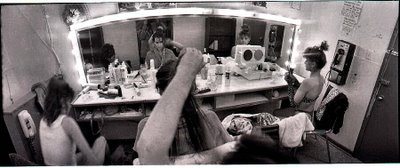
A rare arts assignment to photograph baritone Greer Grimsley who is to appear in the Vancouver Opera’s production of Strauss’ Salome had me thinking. I am to photograph the man in a special effects studio where they are going to make a life mask from which they will then model St John the Baptist’s ( Jokanaan in the opera) severed head. It would seem that since time immemorial man (as in politically incorrect “the male of the species”) has been ready to give up just about anything to see a woman undraped.
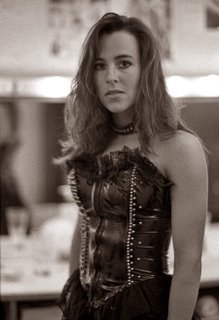
That the current play by the Electric Theatre Company and presented by the Vancouver Playhouse Theatre Company, Studies in Motion – The Hauntings of Eadweard Muybridge has not created any obvious stir of shock or at least a stream of salacious blogs or letters to the editor (and it is a terrific play which I have seen three times) has something to say about the current state of affairs between man (the male of the species) and his forsaking of the enjoyment of the undraped female form. The play has a cast of 11 (about 60% men) and all undrape fully. If you sit on the front row you can dispense with the binoculars.

If anybody had told anybody in Vancouver that our fair city would one day not be known for its excellent strippers, its squeaky clean strip bars and that by 2009 there would only be three strip bars left within city limits they would have not been believed. But that is a fact that strip bars are all but gone and the B-lineup St Regis is now a luxury boutique hotel! Who would have known? I don’t frequent the strip bars. It is not really my sudden shame at liking something that is a bit frowned upon by civilized society.

It is more about being 67 and I am losing interest. The idea of a good book, a large mug of tea and bed in the evening is far more an attractive idea than lounging at a bar looking at women take their clothes off. But what do all those young men do these days? Watch pornography on their computers?
It will always be the same that things were better then than now. Punk music then was real punk music. Now it is derivative and imitation punk music. Strippers then danced. Strippers now take their clothes off, period.
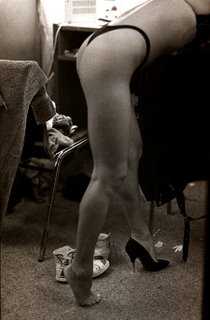
I am sure that I am wrong on all counts and there must be many dancers of note. I know of one who was a ballet dancer before she switched to nude pole dancing. When I last saw her a couple of years ago she was the best pole dancer in the province.
Perhaps my lack of excitement is that the age difference between dancers and this old man becomes a gulf. It was in the late 79s that Vancouver Magazine assigned me to take pictures of women wearing eyewear from boutique frame stores. The art director, Rick Staehling asked me, “The models you used are most unusual. Where did you get them?” I fudged the answer as I did not have the heart to tell him that I had picked my favourite exotic dancers and I had enjoyed giving them their checks for modeling with their clothes all on.
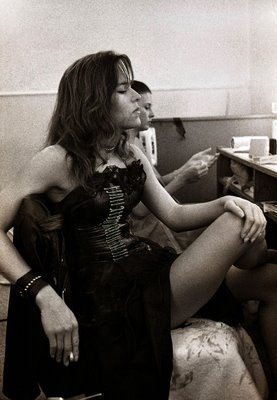
It was at Tony Ricci’s Marble Arch that I could walk in and sit by the bar and talk in Spanish to Jorge the barman. He would offer free drinks but I always had soda water. I felt like Humphrey Bogart walking into a bar. Jorge and Tony made me feel special.
But it was at Tony’s Number 5 Orange in May 1990 that I felt king for a day. I had been assigned by Equity Magazine to take pictures for an article called Sex Sells. Having been convinced through the years by Malcolm Parry to seek the privileged view in all things I knew what I wanted. Parry defines the privileged view more like what you see when you look down as opposed to what you see looking up.
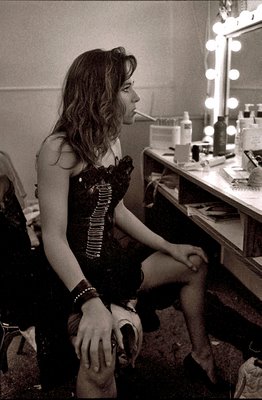
Anybody (of the legal age) can enter a strip club. At the Number 5 Orange Street the tradition has been to see the fully dressed woman step down to the dance floor on a lit Lucite ladder that connects to the roof. As Mac would have said, “Anybody can watch her come down. But to be up there and watch her go down, that would be special.”
I asked Tony if I could take pictures in the dressing room. He smiled, “Anything you want, Alex and I’ll have Daniele accompany you up to make it easier for you.” Daniele was simply one of the most gorgeous women I ever met in my life. Up we went.
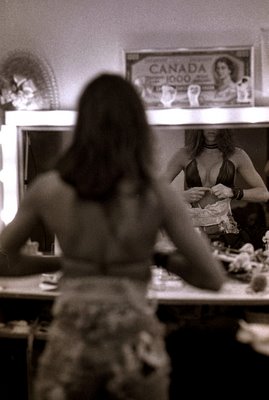
I decided I would photograph the whole routine of one dancer. I was in luck because Portia Winters was up there so I took many pictures of the process. I learned one interesting fact about strip bars of those years. There were traveling male hairdressers who did hair for the dancers. One was there to fix up Portia. Remembering Mac Parry I managed to photograph Portia going down the golden stairs.
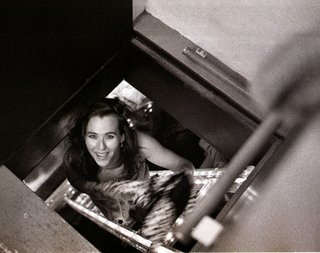
The best moment of the day came when I finished and Danielle (Kimberly) and I went down to the bar. Danielle had well toned arms and helped me with my heavy lights. My friend Sean Rossiter happened to be in the bar and when he saw me and my assistant and, where we were coming from he just about collapsed with wonder. He has never allowed me to forget the day. Not that I would.
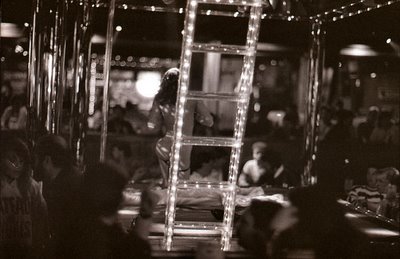
No Jif For Buckley
Tuesday, January 13, 2015
 |
| William F.Buckley Jr. - Alex Waterhouse-Hayward |
Somehow the differences between the right and the left have
become more distant even though communism as we knew it is gone and the most
Dickensian and corrupt capitalist nation in the world is the former Soviet
Union.
Those differences were clearer in the past century but at
the same time you had Nixon showing Khrushchev an ideal American kitchen and
the right and the left still talked to each other. No matter how strident the
arguments were between right wing William F. Buckley Jr. and left-wing liberal
Gore Vidal I have a sneaking suspicion that they admired their mutual talents
for good English and declamation talents, not to mention the biting
intelligence they shared.
Because I lived for five formative years in Austin, Texas I
consider part of me to be American and I have always been interested in
American politics. Were I truly an American I would vote for the Democrats as I
deplore the almost across-the-board stupidity of the Republicans who have long forgotten
that they were (and certainly are not now) the Party of Lincoln.
In the 60s while already a leftie I had admiration for the
Republican Minority Leader of the US Senate, Everett McKinley Dirksen. I loved
his oratory and his sense of humour. In later years I admired Senator Barry
Goldwater’s photographic expertise and his portraits of the natives of his
state are very good. And to boot he could pilot a jet fighter.
When some years ago I had my chance to take portraits of
William F. Buckley I was thrilled. I might not have agreed with his pragmatic
(to be fair) conservative views but I loved his command of English.
When I spotted this article in my daily delivered (hard
copy) NY Times I didn’t feel that “sharing” it in facebook was quite the right
thing. It would probably be lost to many. Now here is the article in its
entirety and I hope the NY Times Copyright Police and writer David Segaljan do not come after me.
 |
| Credit Ginny Rose Stewart for The New York Times |
Peanut Butter With Sticking Power
How Red Wing Became William
F. Buckley Jr.'s Favorite Peanut Butter
By DAVID SEGALJAN. 12, 2015
FREDONIA, N.Y. — Throughout a life of erudite jousting and
patrician bonhomie, William F. Buckley Jr. was known as a conservative, a
writer, a publisher, a talk-show host, a novelist and an avid sailor. But
friends and family would say this biographical summary is incomplete without
three more words: peanut butter freak.
Mr. Buckley didn’t just devour the stuff; he rhapsodized
about it, telling readers in a 1981 column in National Review, the magazine he
founded, that when he first married, he told his wife that he “expected peanut
butter for breakfast every day of my life, including Ash Wednesday.”
This lifelong passion was nurtured during Mr. Buckley’s
years in an English boarding school, when his father sent twice-a-month care
packages that included grapefruits and a large jar of peanut butter. To his
astonishment, British pals who shared in his bounty loved the grapefruit and
spat out the peanut butter.
“No wonder,” he wrote in that same column, “they needed
American help to win the war.”
For years, Mr. Buckley’s favorite brand was Red Wing,
produced in this upstate village 45 miles southwest of Buffalo. A jar of the
peanut butter had been sent to Mr. Buckley soon after that 1981 column by the
executive who then ran the company, Douglas Manly.
“He wrote something about liking Skippy,” said Mr. Manly,
now 87 years old and long retired. “And I asked a sales associate to send him a
jar with a note that said, ‘We think you’ll like this better.’ ”
Mr. Manly was right. Mr. Buckley’s son, the novelist
Christopher Buckley, said in a phone interview: “My dad’s one true quest in
life was for the Platonic ideal of peanut butter. And I remember one day he
announced, with a look of utter transfiguration on his face, that he had found
paradise on earth in a jar with a yellow cap. And it was called Red Wing.”
Mr. Buckley died in 2008, sparing him some heartbreaking
news. ConAgra, the food titan that acquired Red Wing in 2013 when it bought its
parent company, Ralcorp, announced early last year that it would shut down the
Fredonia factory. The entire operation — which includes production lines of
mayonnaise, barbecue sauce and jellies — will close in phases and the doors
will be locked by February. Some 425 workers will lose their jobs.
This doesn’t necessarily mean that the flavor of Red Wing
will disappear. The peanut butter made here is what is known as private label,
produced for supermarket chains catering to value shoppers. If you ever bought
peanut butter sold under labels like Wegmans, Price Chopper, Our Family or
Tops, you were eating Red Wing.
According to ConAgra, the company will continue selling to
corporate customers through another factory, this one in Streator, Ill., with
the same recipe as the one used in Fredonia.
Mr. Manly sounded skeptical. “We can’t be sure,” he said,
“because they won’t be using the same equipment or the same personnel.”
If you want to see the last of the Fredonia Red Wing being
made, Mr. Manly suggested in November, you’d better come quick. Two weeks
later, he provided a tour of the premises, a parting look at the facility and a
firsthand account of how William Buckley became Red Wing’s patron saint.
“It was a whim,” he said of that fateful jar sent to the
offices of National Review, while we drove to the Fredonia factory in his
Hyundai Elantra. “I didn’t really think that anything would come of it.”
A chatty guy with a puckish smile, Mr. Manly occasionally
performs what he calls “stand-up Irish comedy” at assisted living facilities.
But he kept the quips to a minimum as we toured the plant, pointing out parts
of it that are more than 100 years old. Red Wing is produced amid a jumble of
old red brick and modern aluminum-sided buildings on 42 acres of asphalt and
lawn.
Mr. Manly ticked the box for two cases of Red Wing, and when
Peggy went to fill his order, he gestured toward the factory floor and said,
“Let’s go.”
We walked past safety and warning signs, including one that
read “Allergens in Use.” That seemed like a hopeful hint that the peanut butter
operation was still churning, but when we reached that part of the plant, there
was not a peanut in sight. The line had shut down in November, we were later
told, though all the machinery was still in place.
That included a peanut roaster once hailed as the world’s
largest, built to process 10 tons an hour. Mr. Buckley was on hand for the 1982
ribbon-cutting for this industrial behemoth because soon after he discovered
the joys of Red Wing, Mr. Manly invited him to speak at the ceremony.
“Without hesitation, my dad said, ‘I’ll be there,’ ”
Christopher Buckley recalled with a chuckle. “I never saw him accept an
invitation faster. And he’d been invited to palaces in his day and said, ‘I’ll
have to think about it.’ ”
There are articles of Mr. Buckley’s visit, which lacked only
a brass band and bunting. When Mr. Buckley and his wife, Pat, reached the
roaster, a few hundred employees were waiting to hear him speak. In a photo of
the event, Mr. Buckley grins in a white lab coat over his jacket and tie.
“Thank you for letting me attend this historic occasion,”
Mr. Buckley told the crowd, neatly finding the seam between the grandiose and
the comic. He said that he wished Red Wing could be served at United
States-Soviet disarmament talks, because once the Russians sampled it, “they
would give up all their assets, communism and Karl Marx.”
He took questions from reporters and confirmed that his
friend Charlton Heston shared his devotion to peanut butter. Though the actor,
Mr. Buckley added, is of the “chunky reform faith.”
As a thank-you for his service that day, Mr. Buckley was
given a lifetime’s supply of Red Wing — a dozen 18-ounce jars of the smooth
variety, mailed every six months. Each had a custom “Buckley’s Best” label,
with a copy of Mr. Buckley’s autograph and his endorsement, “It is quite simply
incomparable.”
For years afterward, visitors to Mr. Buckley’s home in
Connecticut who expressed any peanut butter enthusiasm were dared to resist Red
Wing’s charms. He praised the brand so extravagantly during a radio interview
on Manhattan’s WMCA that the show’s host, Barry Gray, said listeners cleaned
out local stores.
“The supermarkets in my neighborhood had a run on the peanut
butter,” Mr. Gray told Mr. Buckley when he next appeared on the show. “I don’t
kid you. There were simply no Red Wing jars to be found for weeks.”
In 1985, a New Yorker writer and fellow peanut butter
aficionado, James Stevenson, wrote in the magazine about a pilgrimage to
Fredonia and his own one-man taste test, conducted, he explained, because he
was skeptical about Mr. Buckley’s judgment in international affairs, economics
and virtually everything else. But the man was right about peanut butter.
“Red Wing is superb,” Mr. Stevenson concluded.
Is it really worth all the fuss? Mr. Manly is hardly
emphatic on the question. This may seem surprising, but he was around for Red
Wing’s food-lab formulation, in 1965, and he says the idea was to knock off
Jif, then the favorite in the Northeast.
“We worked on it until employees who were part of a taste
panel could not tell the difference between Red Wing and Jif,” he said, after
the tour, sitting at a table in the rear of his house.
The company wanted a leading-brand impostor because its
sales pitch to supermarket chains was essentially, “This is identical to the
best seller, but less expensive.”
So if Red Wing was simply a Jif impersonation, why were Mr.
Buckley and others so smitten? Mr. Manly has a guess. One way to keep down
costs was to refuse to store much product. During Mr. Manly’s tenure, orders
were accepted 10 days in advance, and no more, limiting the amount of time jars
waited on shelves to be shipped.
Red Wing may have bowled over Mr. Buckley because it was far
fresher than anything he’d ever eaten. Or not. Brand devotion is often a
mystery that flavor can only partly explain. Perhaps discovering an unbidden
jar with an uncelebrated name helped hook Mr. Buckley back in 1981. Perhaps
he’d never tried Jif.
Regardless, the closing of the Fredonia factory can be seen
as the head-on collision of this ardent free marketeer’s two great loves:
capitalism and peanut butter, or at least one production line of one brand of
peanut butter. It’s unlikely that this would have presented a real quandary to
Mr. Buckley, if only because at the time of his death, he had a stockpile of
Red Wing that his son described as large enough “to see the most determined
survivalist through the next Armageddon.”
But the younger Buckley didn’t keep it all.
“The night before his funeral,” he said of his father, “into
his coffin I slipped my mother’s ashes, his rosary, the TV remote control — and
a jar of Red Wing peanut butter. I’d say no pharaoh went off to the next world
better equipped.”
Filing My Paranoia Away
Monday, January 12, 2015
Today I delivered 25 photographs that I took last week
for a good client of mine. They pay me well. I arrived with a small thumb
drive. I prefer, when possible to deliver my photographs in person and not by
the more efficient but still impersonal Dropbox.
The act made me think of an interview I heard on the way
on CBC Radio by guest Damain Abraham. The person interviewed was Stephen Bulger who runs the Stephen Bulger Gallery in Toronto. Recently the gallery had mounted a show of photographs taken by Vivian Maier a virtual unknown while alive who has become most famous since her many thousands of film negatives were discovered in a storage locker.
Bulger said that her pictures, because they were found as
negatives and or unprocessed black and white film could be seen as they were
saved. Had they been found as digital images in some sort of digital storage
device, the chances that they would have been looked at were not good. Bulger
made use of a word that haunted me the whole day. He said that those images
were “fugitive” and perhaps after some years they would have been gone.
I have SyQuest’s and Zip Drives of photographs and
photographic layouts given to me by the many art directors I worked for. I am
not able to open any of them.
Some years ago the Presentation House Gallery brought the
head of the archives of the Metropolitan Museum of Art in New York. She told us
that they were using as many methods available to record for posterity a record
of the museum collection. They were using film cameras, digital cameras and
huge scanners. She told us she was unsure of what methods would still be around
in half a century.
Since I began shooting with a Fuji X-E1 in August 2013 I
have been unsure on how to store my photographs. I have them in a large folder
called Fuji Photo File in two backed up exterior hard drives. I am seriously
thinking on investing in smaller storage cards and using also those as backups.
Another idea is to purchase small thumb drives and store in each one a
particular shoot. I would then store those thumb drives and or storage cards in
a regular hanging file in one of my regular four-drawer ( I have 14) metal
filing cabinets alongside the negatives, slides and photographs that I began to
take in the late 50s.
Not too long ago I would ask my Focal Point students in
what ways they could go home after a photo session to find that there was
nothing there. I was most depressed by their varied answers.
In my trip to Buenos Aires in September 2013 I traveled
with three film cameras and my digital Fuji. I brought along an ancient but
very good Toshiba laptop. I had two Fuji camera batteries and four storage cards.
Every day I would download into a thumb drive the pictures of the day using the
Toshiba as the go-between. I never filled any of the cards but I switched them
randomly every day. I arrive home with all the pictures I had taken.
Illustrating today’s blog are two photographs that almost
did not make it. A few years ago I photographed my indomitable friendly
dominatrix, Yuliya. I photographed her in the home of a friend who had many
interesting artfacts in an apartment with lovely furniture and priceless
carpets. I photographed her with three Nikon FM-2 cameras. One had colour
negative film, a second one 100 ISO b+w film and the third camera Kodak b+w
Infrared Film. I also shot some 6x7 cm pictures with my Mamiya RB. After the
shoot was over while putting my cameras away the back of the camera with the
infrared film opened most suddenly when it fell from a chair.
I could have just thrown the film away. But I took it
home and processed it. Every frame has a light leak. But with my scanner I have
been able to record some interesting ones. What you see here are scans where I
lay the film on the scanner (without a film holder so they don’t lay flat). I scanned
them as if they were documents from the bottom of the scanner and reversed the
images to make the positives. From there I went to Corel X2 to Photo Effect and
chose Cyanotype. I worked a tad with contrast and levels.
The pictures did make it and of that I am satisfied. When I glance at my 14 filing cabinets,
knowing well what could happen if my basement had a fire I realize (smugly)
that this kind of paranoia does not hit people like me but more so all those
photographers who exclusively shoot with one (as in one) digital camera and
thus have all their eggs (digital as they may be) in one basket. Cloud or no
cloud I would feel paranoid, too.
Yuliya the dominatrix
The dominatrix smiles
Jorge José O'Reilly - Primo/Sobrino - Amigo - Campeón de Rugby
Sunday, January 11, 2015
My Mother's Red Shawl - El Rebozo Colorado
Jorge (Georgito) José O'Reilly - Primo/Sobrino - Amigo - Campeón de Rugby
En la
última visita de Alex a Buenos Aires (septiembre/octubre de 2013) se quedó a
vivir en la casa de unos amigos argentinos ubicada en Bella Vista, Provincia de
Buenos Aires a unos 40 Kilómetros de la Capital Federal.
Yo lo
fui a buscar cuando llegó al Aeropuerto de Ezeiza y lo llevé en la despedida también. Durante su estadía lo
transporté algunas veces de un lado para otro e hicimos algunos programas
familiares, no tantos como me hubiera gustado, pero estábamos en tiempo laboral y nos quedaba poco tiempo
disponible para visitas sociales fuera de horario.
Entre esas
idas y venidas sin darme cuenta Alex me pidió que me sacara una foto con un rebozo
mejicano color colorado que heredó de su madre.
La
verdad es que yo no sabía cómo
colocármelo porque entendía que era una prenda femenina y como soy un poco
rústico, me sentía medio incómodo. Primero me lo coloqué como una bufanda pero
era muy grande como tal, así que finalmente me lo puse en un hombro como se
acostumbra a ver a los gauchos salteños en el norte de la Argentina.
Era
realmente pesado y de tela bien gruesa seguramente tejido con lana de muy buena
calidad.
A pesar que
me parecía un poco raro y que Alex me agarró desprevenido, acepté sacármela de
esa forma. Realmente accedí porque sabía que era importante para él y le di el
gusto. Además sabía todo lo afectivo que tenía para Alex y porque no decirlo
era de mi tía abuela política que nunca conocí pero lo más importante era de la
madre de mi primo/tío Alex a quien quiero y aprecio como un buen amigo y nunca
se lo dije.
|
































